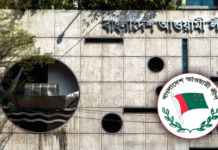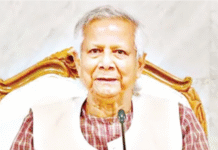
The interim government should be unstinting in seeking consensus among political parties and other key groups, such as the army and students, as it faces key challenges in carrying out political, economic, administrative, and electoral reforms, said Brussels-based International Crisis Group in a report yesterday.
The report also stressed the need for foreign governments and multilateral institutions’ support for carrying out the reforms.
ICG in its report titled “A New Era in Bangladesh? The First Hundred Days of Reform” said the Bangladesh government led by Professor Muhammad Yunus should balance demands for justice with the need for reconciliation, staying within the bounds of the constitution to mitigate the danger of its decisions being invalidated later.
The ICG report came as the interim government completed its 100 days in office following the ouster of Sheikh Hasina-led Awami League government on August 5. The Yunus-led government took charge on August 8.
The report said the government, which is expected to remain in office for another year or longer, should seek to hold fresh elections under a reformed polling system within a realistic timeframe, which should not extend beyond eighteen months.
According to the report, after fifteen years of Hasina’s rule, Bangladesh has a once-in-a-generation opportunity to improve governance and put checks in place that would stop another autocratic regime from emerging. If the interim government falters, however, the country could revert to the status quo ante or even enter a period of military rule.
The interim government should aim to produce quick results to maintain public support for more ambitious reforms. It should avoid staying in power too long and build consensus on new measures among political parties. External actors should offer aid; India should work to repair its image with the Bangladeshi people, it added.
Experience suggests that the longer an interim government is in power, the louder calls for early elections gets and the larger doubts about its legitimacy grows.
Managing, let alone meeting, sky-high public expectations will be extremely challenging, reads the report.
The report mentioned that Yunus and his colleagues for now are enjoying widespread support, but popular expectations are “double-edged”. If the interim administration falters in making reforms, the outcome is likely to be an early election with little progress; in the worst-case scenario, the military could assume power.
Over the past fifteen years, hundreds of billions of dollars have likely been funnelled illegally out of Bangladesh. Much of the money appears to have ended up in the United Kingdom, the US, the EU, Singapore and the Middle East, the report stated.
Already in bad shape, Bangladesh’s economy is limping along, having taken a further hit from more than a month of protests and the uncertainty of the transition. Yunus’s team has struggled to restore law and order, dependent largely on a police force that was heavily implicated in the anti-protest repression, it reads.
It said rebuilding the country’s institutions will also be no mean feat, and while the interim administration is the most inclusive Bangladesh has ever seen, many of its members have little experience in government or management.
The interim government should look to keep its social support base strong as it builds consensus around key reforms and prepares the country for credible elections. International actors should back Yunus’s administration and bolster the Bangladeshi economy to help inaugurate a new era in national politics, reads the report.
Daily Star









